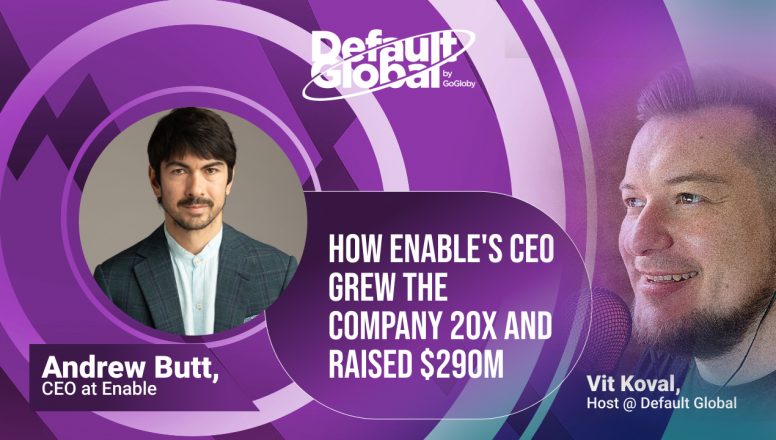Meet Dee Coakley, CEO at Boundless:
Dee, the CEO of Boundless, began her career in the music industry, working with artists like Beyonce and Morrissey. However, her fascination with technology led her to transition into the tech sector. Through her experiences managing international teams, Dee recognized the complexities of employing remote workers across different countries. This inspired her to establish Boundless, a platform dedicated to simplifying global employment for remote teams. With a passion for empowering distributed workforces, Dee is revolutionizing the way companies support and navigate the challenges of remote work.
Listen Up: Dee Coakley, CEO at Boundless — Full Podcast Episode on Spotify
Watch Now: Dee Coakley’s In-Depth Talk with Vit Koval
Quick Read: Dee Coakley, CEO at Boundless, Interview Highlights
What an employer of record is, and how it assists companies in employing remote workers across various locations and time zones?
Dee explained the complexities involved when asked about the concept of an employer of record and its role in facilitating global employment. She highlighted two major challenges: HR compliance and payroll. Companies must navigate the employment laws and obligations of each country where remote workers are located, while also ensuring compliance with tax regulations and managing benefits.
Dee introduced Boundless as a unique EOR platform that stands apart from traditional intermediaries. Boundless owns its infrastructure, enabling full control over quality and the employee experience. This infrastructure spans multiple countries, relieving companies of the need to establish legal entities, tax registrations, and benefits providers. Boundless acts as the legal employer, handling paperwork, providing necessary information, processing payroll, filing taxes, and making payments to workers and authorities.
Dee’s insights shed light on the critical role played by EOR platforms like Boundless in simplifying global employment for remote teams. By leveraging their HR compliance and payroll management expertise, companies can focus on their core business while navigating the challenges of employing a distributed workforce. As remote work continues to reshape the employment landscape, solutions provided by EORs prove invaluable for companies embracing the remote revolution.
What are the key questions founders should ask to ensure they’re partnering with a reliable and trustworthy employer for record providers?
When asked about assessing EOR providers, Dee stressed the significance of selecting a company that prioritizes compliance. Being an employer comes with significant responsibilities, and partnering with a reputable EOR provider is crucial for ensuring legal adherence and avoiding potential fines. Dee recommended asking specific questions during the evaluation process to gauge the provider’s suitability.
Dee highlighted two key questions to ask potential EOR providers. Firstly, it is essential to determine whether the provider owns its infrastructure, including local entities in different countries. This ensures that the company you’re working with maintains full control and accountability throughout the employment process. Dee’s quote perfectly encapsulates this point: “Do they own their own entities? Who will the actual employer be?” Understanding the level of control and direct communication is vital in establishing a solid partnership.
Secondly, Dee advised evaluating the EOR provider’s response times and customer support quality. Delays in addressing queries or resolving payroll issues can lead to significant employee dissatisfaction. Dee shared an eye-opening example where a company had to wait three to four days for a response from their previous EOR provider. In contrast, Boundless maintains an average response time of one hour, even outside office hours, ensuring prompt assistance and timely payroll resolution.
Additionally, Dee suggested requesting access to sample employment agreements from different countries to assess the provider’s quality and alignment with local laws. While the agreements may differ due to country-specific requirements, there should be consistency in terms of quality and approach. Transparency and direct access to country-specific HR compliance and payroll experts were also emphasized as crucial aspects of a positive customer experience.
Dee Coakley’s expert advice serves as a valuable guide for founders and executives seeking a reliable EOR partner. By prioritizing compliance, infrastructure ownership, responsiveness, and expertise, companies can make informed decisions and forge successful partnerships that streamline global employment processes. As the demand for remote work and global hiring continues to rise, selecting a trustworthy EOR provider becomes a pivotal factor for companies navigating the complexities of employment compliance and expanding their international workforce.
How is it possible to stay up to date with the legal requirements in each of countries you’re operating?
Dee mentioned that they currently cover 25 countries, with a strong presence in Europe and a diverse spread across regions like Australia, New Zealand, Singapore, Canada, Brazil, Mexico, and Chile. Notably, Dee emphasized that Boundless acts as the direct employer in all countries except Brazil, where they work with a local partner due to specific employment legislation.
Inquiring about how Boundless remains compliant and keeps clients secure amidst changing legal requirements, the host raised an important question. Dee acknowledged the challenges in this space, particularly with the rapid growth experienced during the COVID-19 pandemic. Dee highlighted Boundless’ thoughtful approach, contrasting it with the speed-focused strategies many other EOR industry players adopted.
Dee explained that Boundless takes the time to build a high-quality solution, recognizing that it requires expertise and effort. They have an in-house HR compliance team and global payroll team, with individuals specializing in specific countries. To ensure comprehensive compliance, Boundless collaborates with best-in-class local employment lawyers, accountants, and tax experts in each country they operate in.
When clients reach out with queries, Boundless prioritizes immediate response for common issues within their expertise. However, they consult their in-country legal partners for specialized or complex situations, providing this service at no additional cost to their customers. Dee emphasized the importance of staying informed about legislative changes, which is achieved through regular check-ins with their in-country experts. Boundless also proactively updates their country guides and produces content to inform clients about upcoming changes, particularly around the new year when many countries implement legislative updates.
Dee Coakley’s insights shed light on Boundless’ proactive approach to compliance, ensuring that clients remain informed and secure in their global operations. By leveraging a combination of in-house expertise and strong partnerships with local professionals, Boundless demonstrates their commitment to providing comprehensive and up-to-date solutions for navigating the complexities of employment compliance in multiple countries. As companies increasingly embrace global hiring and remote work arrangements, reliable EOR partners like Boundless play a vital role in supporting seamless operations and ensuring legal compliance across borders.
What are the preferences of tech talent across different countries regarding employment models and compensation?
Vit began by addressing the idea that secure and stable employment can serve as an effective recruitment and retention tool. However, they raised a common challenge, particularly in countries like Brazil, Argentina, and Colombia, where inflationary pressures can lead senior tech talent to prefer B2B contracts and compensation in stable currencies like US dollars or euros. Vit expressed concern that companies utilizing the Employer of Record (EOR) model might miss out on this pool of highly skilled individuals.
Dee acknowledged the country-specific nature of talent preferences, citing Ukraine as an example where independent contractor status is attractive due to specific legislation. She highlighted the importance of considering the varying dynamics across regions. For instance, employment rights and protections hold significant value in Ireland and many European countries, making permanent employment a preferred choice. Dee noted that the concept of independent contracting might not be appealing to individuals in these countries, as it lacks the tax benefits and employment safeguards associated with traditional employment.
Addressing how Boundless tackles this issue, Dee emphasized that the approach is tailored to each country and individual company’s goals. Companies make decisions based on factors such as the nature of their operations, growth stage, and specific metrics they seek to optimize. For example, a company aiming to increase its valuation might prioritize building a team of permanent employees, as independent contractors may not contribute to the company’s overall value in a potential sale. Conversely, other companies may value flexibility in headcount and opt for independent contractors to maintain low headcounts.
Dee underscored that legal considerations are crucial in determining employment models and compensation arrangements. While workers may express preferences for independent contractor agreements or payment in foreign currencies, it is essential to adhere to local laws. Compliance remains a priority, especially for larger companies, as breaking the law can have serious consequences. In many countries, payroll must be paid in local currency through a local bank account, leaving little room for flexibility.
However, Dee also highlighted the negotiation power that top tech talent possesses in the current remote work landscape. Companies must recognize this and be open to finding alternative solutions or arrangements that make their employment offers attractive. Workers can leverage their skills and expertise to negotiate benefits such as private medical insurance or other considerations that offset the lack of specific compensation preferences.
How does your company mitigate the risk of companies not having full control over their employees and potentially facing negative consequences for both parties?
Dee acknowledged the legal complexities surrounding accepting the EOR model in different countries. The recognition and regulation of EOR vary from country to country. Germany, for example, has clear legislation allowing EOR models and requires licensing for compliance. France operates a unique model called “portage salarial,” which is a regulated space where EORs provide services to workers rather than directly to companies. In the UK, EOR is not expressly regulated but is not restricted by employment or contract law.
Dee explained that their company, Boundless, operates under different models based on the legal landscape of each country. They employ a tripartite co-employment arrangement where Boundless is named as the employer of record responsible for compliance, while the customer company manages the relationship with the worker and allocates work. The worker is the third party in this agreement. The specific structure and legal recognition of EOR vary, and Boundless adapts its operations accordingly. In some cases, they act as an employment agency to comply with local laws. However, Dee emphasized that not all EOR companies prioritize risk mitigation and compliance. Some disregard legal limitations, which could pose significant risks for their customers. For instance, except in limited circumstances, EOR is expressly prohibited in Spain. Dee highlighted the importance of asking prospective EOR providers about their approach to compliance and how they navigate legal challenges. As a compliance-focused company, Boundless strictly adheres to the law and avoids supporting EOR relationships where it is not legally permissible.
Could you share three tips for companies new to global hiring, focusing on a successful international hiring experience?
Dee provided insights on three key areas for companies venturing into global hiring. Firstly, she emphasized the complexity of international team pay. Leaders need to establish a clear compensation philosophy and approach. This involves deciding whether to benchmark salaries to a headquarters (HQ) country or to the local market rates. The importance of consistency in compensation practices was highlighted to avoid disparate pay scales that can complicate management and future adjustments. Dee also emphasized the need to consider varying employer taxes and income taxes in different countries, as these factors significantly impact costs and take-home pay.
Secondly, Dee discussed the significance of communication and collaboration in distributed teams. When there is a central HQ office and remote team members, avoiding creating a divisive “them and us” culture is crucial. Creating intentional practices, such as ensuring everyone joins meetings with cameras on and providing equal opportunities for participation, helps foster a cohesive and inclusive work environment.
Lastly, Dee stressed the importance of bringing remote team members together periodically. Face-to-face interactions allow team members to form stronger relationships, enhance communication, and increase productivity. At Boundless, Dee’s company, they organize in-person gatherings three times a year, which significantly impact the team’s dynamics and effectiveness.
In conclusion, companies entering the realm of global hiring should prioritize considerations such as establishing a clear compensation approach, fostering inclusive communication and collaboration practices, and organizing opportunities for face-to-face interactions. Organizations can lay a strong foundation for successful international hiring experiences and effectively manage their global workforce by focusing on these areas.






